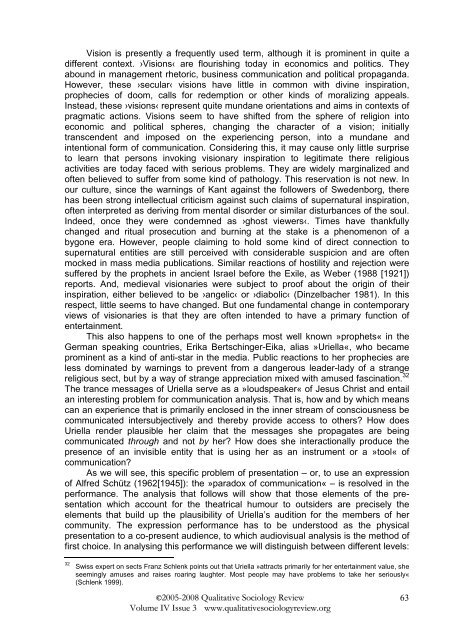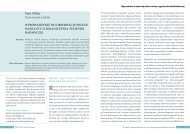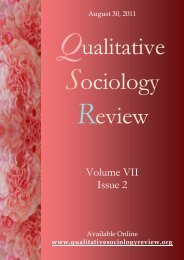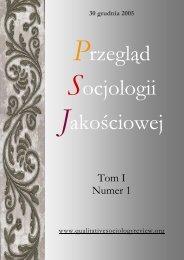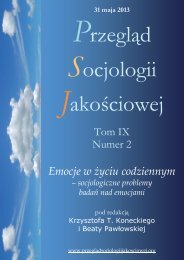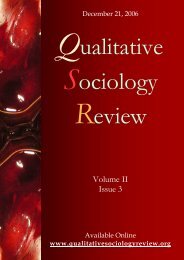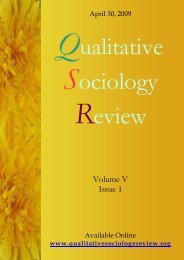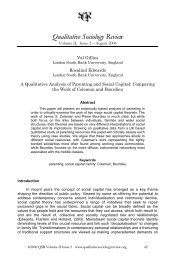volume IV is 3 - Qualitative Sociology Review
volume IV is 3 - Qualitative Sociology Review
volume IV is 3 - Qualitative Sociology Review
Create successful ePaper yourself
Turn your PDF publications into a flip-book with our unique Google optimized e-Paper software.
V<strong>is</strong>ion <strong>is</strong> presently a frequently used term, although it <strong>is</strong> prominent in quite a<br />
different context. ›V<strong>is</strong>ions‹ are flour<strong>is</strong>hing today in economics and politics. They<br />
abound in management rhetoric, business communication and political propaganda.<br />
However, these ›secular‹ v<strong>is</strong>ions have little in common with divine inspiration,<br />
prophecies of doom, calls for redemption or other kinds of moralizing appeals.<br />
Instead, these ›v<strong>is</strong>ions‹ represent quite mundane orientations and aims in contexts of<br />
pragmatic actions. V<strong>is</strong>ions seem to have shifted from the sphere of religion into<br />
economic and political spheres, changing the character of a v<strong>is</strong>ion; initially<br />
transcendent and imposed on the experiencing person, into a mundane and<br />
intentional form of communication. Considering th<strong>is</strong>, it may cause only little surpr<strong>is</strong>e<br />
to learn that persons invoking v<strong>is</strong>ionary inspiration to legitimate there religious<br />
activities are today faced with serious problems. They are widely marginalized and<br />
often believed to suffer from some kind of pathology. Th<strong>is</strong> reservation <strong>is</strong> not new. In<br />
our culture, since the warnings of Kant against the followers of Swedenborg, there<br />
has been strong intellectual critic<strong>is</strong>m against such claims of supernatural inspiration,<br />
often interpreted as deriving from mental d<strong>is</strong>order or similar d<strong>is</strong>turbances of the soul.<br />
Indeed, once they were condemned as ›ghost viewers‹. Times have thankfully<br />
changed and ritual prosecution and burning at the stake <strong>is</strong> a phenomenon of a<br />
bygone era. However, people claiming to hold some kind of direct connection to<br />
supernatural entities are still perceived with considerable suspicion and are often<br />
mocked in mass media publications. Similar reactions of hostility and rejection were<br />
suffered by the prophets in ancient Israel before the Exile, as Weber (1988 [1921])<br />
reports. And, medieval v<strong>is</strong>ionaries were subject to proof about the origin of their<br />
inspiration, either believed to be ›angelic‹ or ›diabolic‹ (Dinzelbacher 1981). In th<strong>is</strong><br />
respect, little seems to have changed. But one fundamental change in contemporary<br />
views of v<strong>is</strong>ionaries <strong>is</strong> that they are often intended to have a primary function of<br />
entertainment.<br />
Th<strong>is</strong> also happens to one of the perhaps most well known »prophets« in the<br />
German speaking countries, Erika Bertschinger-Eika, alias »Uriella«, who became<br />
prominent as a kind of anti-star in the media. Public reactions to her prophecies are<br />
less dominated by warnings to prevent from a dangerous leader-lady of a strange<br />
religious sect, but by a way of strange appreciation mixed with amused fascination. 32<br />
The trance messages of Uriella serve as a »loudspeaker« of Jesus Chr<strong>is</strong>t and entail<br />
an interesting problem for communication analys<strong>is</strong>. That <strong>is</strong>, how and by which means<br />
can an experience that <strong>is</strong> primarily enclosed in the inner stream of consciousness be<br />
communicated intersubjectively and thereby provide access to others? How does<br />
Uriella render plausible her claim that the messages she propagates are being<br />
communicated through and not by her? How does she interactionally produce the<br />
presence of an inv<strong>is</strong>ible entity that <strong>is</strong> using her as an instrument or a »tool« of<br />
communication?<br />
As we will see, th<strong>is</strong> specific problem of presentation – or, to use an expression<br />
of Alfred Schütz (1962[1945]): the »paradox of communication« – <strong>is</strong> resolved in the<br />
performance. The analys<strong>is</strong> that follows will show that those elements of the presentation<br />
which account for the theatrical humour to outsiders are prec<strong>is</strong>ely the<br />
elements that build up the plausibility of Uriella’s audition for the members of her<br />
community. The expression performance has to be understood as the physical<br />
presentation to a co-present audience, to which audiov<strong>is</strong>ual analys<strong>is</strong> <strong>is</strong> the method of<br />
first choice. In analysing th<strong>is</strong> performance we will d<strong>is</strong>tingu<strong>is</strong>h between different levels:<br />
32<br />
Sw<strong>is</strong>s expert on sects Franz Schlenk points out that Uriella »attracts primarily for her entertainment value, she<br />
seemingly amuses and ra<strong>is</strong>es roaring laughter. Most people may have problems to take her seriously«<br />
(Schlenk 1999).<br />
©2005-2008 <strong>Qualitative</strong> <strong>Sociology</strong> <strong>Review</strong><br />
Volume <strong>IV</strong> Issue 3 www.qualitativesociologyreview.org<br />
63


